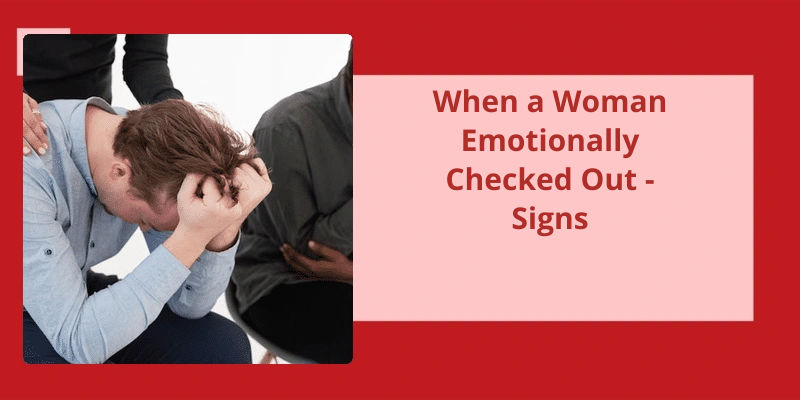The emotional wellbeing of women is often taken for granted, and the importance of their mental health is often overlooked. Women aren’t immune to emotional struggles, and there are times when they feel overwhelmed and drained by their daily routine. It isn’t uncommon for women to emotionally check out, which can be the result of various reasons – perhaps due to stress at work or family-related issues. Emotional detachment can be debilitating, and it can significantly impact a woman's quality of life, personal relationships, and even professional achievements. The concept of checking out emotionally is often stigmatized, and women are expected to keep their emotions under control at all times. However, it’s important to acknowledge that emotional detachment is a natural response to overwhelming circumstances, and it’s essential to address it in a healthy and constructive way. In this article, we will explore what it means when a woman emotionally checks out, what causes it, and ways to cope and heal.
What Does It Mean to Be Checked Out in a Relationship?
When someone is checked out in a relationship, it means that they’ve disconnected emotionally from their partner. They may still be physically present, but they’re no longer invested in the relationship. This can manifest in a variety of ways, such as decreased communication, lack of intimacy, or lack of interest in spending time with their partner.
Checking out in a relationship can be a defense mechanism that people use when they’re experiencing emotional pain or stress. It allows them to distance themselves from the relationship and avoid dealing with difficult emotions. However, this behavior can be damaging to the relationship and can ultimately lead to it’s demise.
If you suspect that your partner is checking out of the relationship, it’s important to talk to them about it. Try to approach the conversation from a place of compassion and empathy, rather than judgment or anger. Ask them to share their feelings and concerns with you and listen actively without interrupting or dismissing their perspective.
In some cases, couples may be able to work through issues and reconnect after one partner has checked out. However, in other cases, it may be healthier for both partners to move on and pursue other relationships. Ultimately, the key to a successful relationship is mutual respect, open communication, and a willingness to work through challenges together.
Signs That Someone May Be Checking Out of a Relationship
- Decreased communication or response time
- Avoidance of spending time together
- Lack of enthusiasm or interest in the relationship
- Less physical intimacy or affection
- Increase in arguments or disagreements
- Lack of future planning or commitment
- Secretive or guarded behavior
- Less effort put into maintaining the relationship
- Focus on individual interests or activities instead of shared experiences
- Emotional distance or detachment
However, when emotional checking out becomes a regular coping mechanism, it can have negative impacts on our mental health and relationships. It’s important to understand the reasons why we check out emotionally and how to overcome this pattern in order to lead a more fulfilling life.
Why Do People Emotionally Check Out?
Sometimes, people emotionally check out because they’ve been dealing with ongoing stressors and have reached their limit. Their brain requires a break from overwhelming emotions, and so they disengage in order to prevent burnout. Other times, the desire to check out can stem from chronic pain or physical illness, which can drain a persons energy and make it harder to cope with daily stressors. This disconnection can lead to feelings of guilt and shame, which can make it even more challenging to re-engage and connect with others.
At times, people emotionally check out because they fear vulnerability and have learned to protect themselves from emotional pain. These individuals may have a history of traumatic experiences or chronic invalidation, and may struggle with trusting others or opening up about their feelings. This can make it difficult for them to form close relationships and may lead to feelings of isolation and loneliness.
For instance, a person who never learned how to regulate their emotions may struggle to cope with anxiety or overwhelming sadness. And so, emotionally checking out can provide a temporary escape from these uncomfortable feelings.
Moreover, people may check out emotionally when they feel unsupported or misunderstood. This can occur when others fail to validate their emotions or provide the necessary support during a difficult time. When people struggle to feel seen and heard, they may begin to believe that their emotions don’t matter, leading to disconnection and emotional withdrawal.
Overall, people emotionally check out for different reasons, and it remains a complex and multifaceted issue. If you find yourself disengaging emotionally from others, it’s important to reach out for support and seek professional help if needed. Through therapy and support, it’s possible to move towards greater emotional regulation and connection with others.
Conclusion
It’s often a gradual process that results from accumulated emotional pain or unfulfilled expectations. Therefore, it’s crucial to show empathy, compassion, and support to those who’re struggling with emotional detachment and help them find healthy ways to address their emotional needs and reconnect with their emotions.






